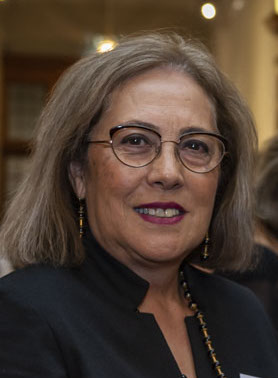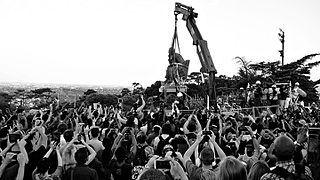Food sovereignty is a food system in which the people who produce, distribute, and consume food also control the mechanisms and policies of food production and distribution. This stands in contrast to the present corporate food regime, in which corporations and market institutions control the global food system. Food sovereignty emphasizes local food economies, sustainable food availability, and centers culturally appropriate foods and practices. Changing climates and disrupted foodways disproportionately impact indigenous populations and their access to traditional food sources while contributing to higher rates of certain diseases; for this reason, food sovereignty centers indigenous peoples. These needs have been addressed in recent years by several international organizations, including the United Nations, with several countries adopting food sovereignty policies into law. Critics of food sovereignty activism believe that the system is founded on inaccurate baseline assumptions; disregards the origins of the targeted problems; and is plagued by a lack of consensus for proposed solutions.
Interculturalism is a political movement that supports cross-cultural dialogue and challenging self-segregation tendencies within cultures. Interculturalism involves moving beyond mere passive acceptance of multiple cultures existing in a society and instead promotes dialogue and interaction between cultures. Interculturalism is often used to describe the set of relations between indigenous and western ideals, grounded in values of mutual respect.
Native American studies is an interdisciplinary academic field that examines the history, culture, politics, issues, spirituality, sociology and contemporary experience of Native peoples in North America, or, taking a hemispheric approach, the Americas. Increasingly, debate has focused on the differences rather than the similarities between other Ethnic studies disciplines such as African American studies, Asian American Studies, and Latino/a Studies.

Indigenous archaeology is a sub-discipline of Western archaeological theory that seeks to engage and empower indigenous people in the preservation of their heritage and to correct perceived inequalities in modern archaeology. It also attempts to incorporate non-material elements of cultures, like oral traditions, into the wider historical narrative. This methodology came out of the global anti-colonial movements of the 1970s and 1980s led by aboriginal and indigenous people in settler-colonial nations, like the United States, Canada, and Australia. Major issues the sub-discipline attempts to address include the repatriation of indigenous remains to their respective peoples, the perceived biases that western archaeology's imperialistic roots have imparted into its modern practices, and the stewardship and preservation of indigenous people's cultures and heritage sites. This has encouraged the development of more collaborative relationships between archaeologists and indigenous people and has increased the involvement of indigenous people in archaeology and its related policies.

Indigenous education specifically focuses on teaching Indigenous knowledge, models, methods, and content within formal or non-formal educational systems. The growing recognition and use of Indigenous education methods can be a response to the erosion and loss of Indigenous knowledge through the processes of colonialism, globalization, and modernity.

Linda Tuhiwai Te Rina Smith, previously a professor of indigenous education at the University of Waikato in Hamilton, New Zealand, is now Distinguished Professor at Te Whare Wānanga o Awanuiārangi.

Decoloniality is a school of thought that aims to delink from Eurocentric knowledge hierarchies and ways of being in the world in order to enable other forms of existence on Earth. It critiques the perceived universality of Western knowledge and the superiority of Western culture, including the systems and institutions that reinforce these perceptions. Decolonial perspectives understand colonialism as the basis for the everyday function of capitalist modernity and imperialism. Decoloniality emerged as part of a South America movement examining the role of the European colonization of the Americas in establishing Eurocentric modernity/coloniality according to Aníbal Quijano, who defined the term and reach. Decolonial theory and practice have recently been subject to increasing critique. For example, Olúfẹ́mi Táíwò argued that it is analytically unsound, that "coloniality" is often conflated with "modernity", and that "decolonisation" becomes an impossible project of total emancipation. Jonatan Kurzwelly and Malin Wilckens, used the example of decolonisation of academic collections of human remains - which were collected during colonial times to support racist theories and give legitimacy to colonial oppression -, and showed how both contemporary scholarly methods and political practice perpetuate reified and essentialist notions of identities.
Native American feminism or Native feminism is, at its root, understanding how gender plays an important role in indigenous communities both historically and in modern-day. As well, Native American feminism deconstructs the racial and broader stereotypes of indigenous peoples, gender, sexuality, while also focusing on decolonization and breaking down the patriarchy and pro-capitalist ideology. As a branch of the broader Indigenous feminism, it similarly prioritizes decolonization, indigenous sovereignty, and the empowerment of indigenous women and girls in the context of Native American and First Nations cultural values and priorities, rather than white, mainstream ones. A central and urgent issue for Native feminists is the Missing and murdered Indigenous women crisis.
Indigenous feminism is an intersectional theory and practice of feminism that focuses on decolonization, Indigenous sovereignty, and human rights for Indigenous women and their families. The focus is to empower Indigenous women in the context of Indigenous cultural values and priorities, rather than mainstream, white, patriarchal ones. In this cultural perspective, it can be compared to womanism in the African-American communities.
Critical pedagogy of place is a curricular approach to education that combines critical pedagogy and place-based education. It started as an attitude and approach to place-based and land-based education that criticized place-based education's invisible endorsement of colonial narratives and domineering relationships with the land. The scholars critiquing place-based education mainly focused on re-centering Indigenous voices in the curriculum. In the early 1990s, C.A. Bowers advocated for a critical pedagogy of place that acknowledged our enmeshment in cultural and ecological systems, and the resulting need for this to figure in the school curriculum. In 2003, David A. Greenwood introduced and defined the term "Critical Pedagogy of Place." In the years since, the general ideas of critical pedagogy of place have been incorporated into many scholars' critiques of place-based, land-based, and environmental education.
Indigenous planning is an ideological approach to the field of regional planning where planning is done by Indigenous peoples for Indigenous communities. Practitioners integrate traditional knowledge or cultural knowledge into the process of planning. Indigenous planning recognizes that "all human communities plan" and that Indigenous communities have been carrying out their own community planning processes for thousands of years. While the broader context of urban planning, and social planning includes the need to work cooperatively with indigenous persons and organizations, the process in doing so is dependent on social, political and cultural forces.

Norman Kent Denzin was an American professor of sociology. He was an emeritus professor in the Department of Sociology at the University of Illinois at Urbana–Champaign, where he was research professor of communications, College of Communications scholar, professor of sociology, professor of cinema studies, professor in the Unit for Criticism and Interpretive Theory. Denzin's academic interests included interpretive theory, performance studies, qualitative research methodology, and the study of media, culture and society.

Angie Morrill is enrolled in the Klamath Tribes in Oregon. She is a former Native admissions recruitment officer for the University of Oregon. She was also a visiting instructor at Oregon State University. She was the Program Director of Title VI Indian Education for Portland Public Schools from 2016-2021. She is a consultant in Native education, and serves as the chairperson of the Tribal Advisory Council for the Sapsik'wala Program at UO College of Education. She is an ecampus instructor at Oregon State University and a pro-tem instructor at University of Oregon where she teaches classes in Native studies.
Indigenous mapping is a practice where Indigenous communities own, control, access, and possess both the geographic information and mapping processes. It is based on Indigenous data sovereignty/intellectual property.

Xicanx is an English-language gender-neutral neologism and identity referring to people of Mexican descent in the United States. The ⟨-x⟩ suffix replaces the ⟨-o/-a⟩ ending of Chicano and Chicana that are typical of grammatical gender in Spanish. The term references a connection to Indigeneity, decolonial consciousness, inclusion of genders outside the Western gender binary imposed through colonialism, and transnationality. In contrast, most Latinos tend to define themselves in nationalist terms, such as by a Latin American country of origin.

Decolonization of knowledge is a concept advanced in decolonial scholarship that critiques the perceived hegemony of Western knowledge systems. It seeks to construct and legitimize other knowledge systems by exploring alternative epistemologies, ontologies and methodologies. It is also an intellectual project that aims to "disinfect" academic activities that are believed to have little connection with the objective pursuit of knowledge and truth. The presumption is that if curricula, theories, and knowledge are colonized, it means they have been partly influenced by political, economic, social and cultural considerations. The decolonial knowledge perspective covers a wide variety of subjects including philosophy, science, history of science, and other fundamental categories in social science.
K. Wayne Yang is a professor and scholar of community organizing, critical pedagogy, and Indigenous and decolonizing studies. He is a professor of ethnic studies at the University of California, San Diego and Provost of John Muir College. He writes about decolonization and everyday epic organizing, often with his frequent collaborator, Eve Tuck. Currently, they are convening The Land Relationships Super Collective, editing the book series, Indigenous and Decolonizing Studies in Education, and editing the journal, Critical Ethnic Studies. He is interested in the complex role of cities in global affairs: cities as sites of settler colonialism, as stages for empire, as places of resettlement and gentrification, and as always-already on Indigenous lands.

Decolonizing Methodologies: Research and Indigenous Peoples is a book by Linda Tuhiwai Smith. Originally published in 1999, Decolonizing Methodologies is a foundational text in Indigenous studies that explores the intersections of colonialism and research methodologies.
Indigenous librarianship is a distinct field of librarianship that brings Indigenous approaches to areas such as knowledge organization, collection development, library and information services, language and cultural practices, and education. The Encyclopedia of Library and Information Sciences states that Indigenous librarianship emerged as a "distinct field of practice and an arena for international scholarship in the late twentieth century bolstered by a global recognition of the value and vulnerability of Indigenous knowledge systems, and of the right of Indigenous peoples to control them."
Cutcha Risling Baldy is a Native American associate professor and department chair of Native American studies at Cal Poly Humboldt in Arcata, California, where just 2.7% of faculty are Indigenous. Risling Baldy focuses her research on Indigenous feminisms, California Indians, Environmental Justice, and Decolonization. Her most notable contribution to the study of Indigenous feminisms was her debut book in 2018, We Are Dancing for You: Native Feminisms and the Revitalization of Women's Coming-of-age Ceremonies. At the 2019 Native American Indigenous Studies Associate Conference, she was awarded “Best First Book in Native American and Indigenous Studies”. Risling Baldy is also a prominent proponent of the Land Back movement committed to restoring Indigenous lands to tribal nations in the United States. Her expertise has been featured in interviews with National Public Radio and various podcasts including For the Wild and Indiginae.









